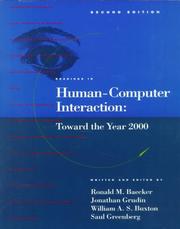| Listing 1 - 4 of 4 |
Sort by
|
Book
ISBN: 9781627059633 1627059636 9781627059473 9781627058896 Year: 2017 Publisher: [San Rafael, California] Morgan & Claypool Publishers
Abstract | Keywords | Export | Availability | Bookmark
 Loading...
Loading...Choose an application
- Reference Manager
- EndNote
- RefWorks (Direct export to RefWorks)
This is the first comprehensive history of human-computer interaction (HCI). Whether you are a user-experience professional or an academic researcher, whether you identify with computer science, human factors, information systems, information science, design, or communication, you can discover how your experiences fit into the expanding field of HCI. You can determine where to look for relevant information in other fields--and where you won't find it. This book describes the different fields that have participated in improving our digital tools. It is organized chronologically, describing major developments across fields in each period. Computer use has changed radically, but many underlying forces are constant. Technology has changed rapidly, human nature very little. An irresistible force meets an immovable object. The exponential rate of technological change gives us little time to react before technology moves on. Patterns and trajectories described in this book provide your best chance to anticipate what could come next. We have reached a turning point. Tools that we built for ourselves to use are increasingly influencing how we use them, in ways that are planned and sometimes unplanned. The book ends with issues worthy of consideration as we explore the new world that we and our digital partners are shaping.
Human-computer interaction --- Human-computer interaction. --- Människa-dator-interaktion --- History. --- Historia. --- #SBIB:309H1730 --- Computer-human interaction --- Human factors in computing systems --- Interaction, Human-computer --- Human engineering --- User-centered system design --- User interfaces (Computer systems) --- History --- Artificiële Intelligentie, knowledge engineering,
Book
ISBN: 3031022181 Year: 2017 Publisher: Cham : Springer International Publishing : Imprint: Springer,
Abstract | Keywords | Export | Availability | Bookmark
 Loading...
Loading...Choose an application
- Reference Manager
- EndNote
- RefWorks (Direct export to RefWorks)
This is the first comprehensive history of human-computer interaction (HCI). Whether you are a user-experience professional or an academic researcher, whether you identify with computer science,human factors, information systems, information science, design, or communication, you can discover how your experiences fit into the expanding field of HCI. You can determine where to look for relevant information in other fields—and where you won't find it. This book describes the different fields that have participated in improving our digital tools.It is organized chronologically, describing major developments across fields in each period. Computer use has changed radically, but many underlying forces are constant. Technology has changed rapidly, human nature very little. An irresistible force meets an immovable object. The exponential rate of technological change gives us little time to react before technology moves on. Patterns and trajectories described in this book provide your best chance to anticipate what could come next. We have reached a turning point. Tools that we built for ourselves to use are increasingly influencing how we use them, in ways that are planned and sometimes unplanned. The book ends with issues worthy of consideration as we explore the new world that we and our digital partners are shaping.
User interfaces (Computer systems). --- Human-computer interaction. --- Application software. --- Computers—History. --- Computers and civilization. --- Technology. --- History. --- Microcomputers. --- User Interfaces and Human Computer Interaction. --- Computer and Information Systems Applications. --- History of Computing. --- Computers and Society. --- History of Technology. --- Personal Computing.
Book
ISBN: 9798400717710 Year: 2024 Publisher: New York : Association for Computing Machinery,
Abstract | Keywords | Export | Availability | Bookmark
 Loading...
Loading...Choose an application
- Reference Manager
- EndNote
- RefWorks (Direct export to RefWorks)
This book offers a compelling discussion of the digital dreams that have come true, their often unintended side effects (nightmares), and what must be done to counteract the nightmares. It is intended as an impetus to further conversation not only in homes and workplaces, but in academic courses and even legislative debates.

ISBN: 1558602461 0080515746 1322465606 9781558602465 Year: 1995 Publisher: San Francisco (Calif.) : Morgan Kaufmann,
Abstract | Keywords | Export | Availability | Bookmark
 Loading...
Loading...Choose an application
- Reference Manager
- EndNote
- RefWorks (Direct export to RefWorks)
Human-computer interaction --- System design --- Interaction homme-machine (Informatique) --- Systèmes, Conception de --- Psychological aspects --- Aspect psychologique --- System Design --- Design, System --- Systems design --- Electronic data processing --- System analysis --- Computer-human interaction --- Human factors in computing systems --- Interaction, Human-computer --- Human engineering --- User-centered system design --- User interfaces (Computer systems) --- Human-computer interaction. --- System design. --- Arbeids- en organisatiepsychologie --- mens-machine interactie --- mens-machine interactie. --- Systèmes, Conception de --- Artificial intelligence. Robotics. Simulation. Graphics
| Listing 1 - 4 of 4 |
Sort by
|

 Search
Search Feedback
Feedback About UniCat
About UniCat  Help
Help News
News